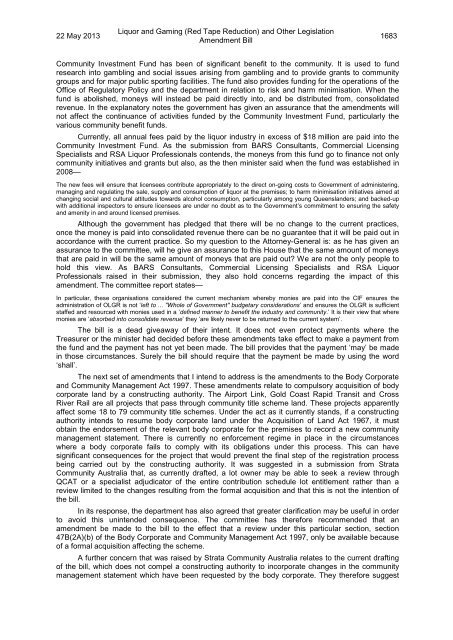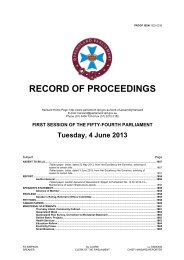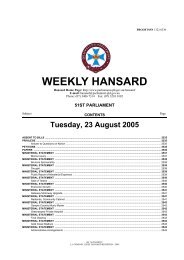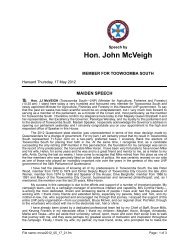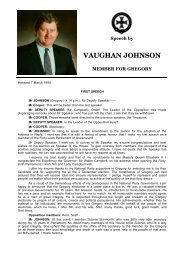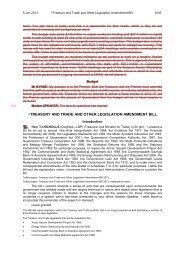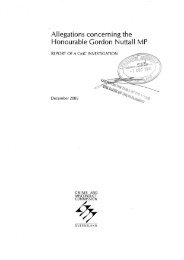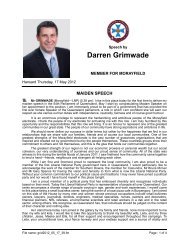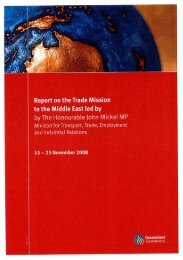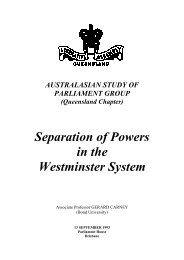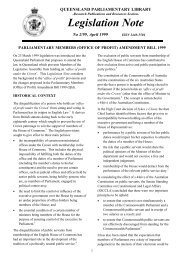RECORD OF PROCEEDINGS - Queensland Parliament ...
RECORD OF PROCEEDINGS - Queensland Parliament ...
RECORD OF PROCEEDINGS - Queensland Parliament ...
Create successful ePaper yourself
Turn your PDF publications into a flip-book with our unique Google optimized e-Paper software.
22 May 2013<br />
Liquor and Gaming (Red Tape Reduction) and Other Legislation<br />
Amendment Bill<br />
1683<br />
Community Investment Fund has been of significant benefit to the community. It is used to fund<br />
research into gambling and social issues arising from gambling and to provide grants to community<br />
groups and for major public sporting facilities. The fund also provides funding for the operations of the<br />
Office of Regulatory Policy and the department in relation to risk and harm minimisation. When the<br />
fund is abolished, moneys will instead be paid directly into, and be distributed from, consolidated<br />
revenue. In the explanatory notes the government has given an assurance that the amendments will<br />
not affect the continuance of activities funded by the Community Investment Fund, particularly the<br />
various community benefit funds.<br />
Currently, all annual fees paid by the liquor industry in excess of $18 million are paid into the<br />
Community Investment Fund. As the submission from BARS Consultants, Commercial Licensing<br />
Specialists and RSA Liquor Professionals contends, the moneys from this fund go to finance not only<br />
community initiatives and grants but also, as the then minister said when the fund was established in<br />
2008—<br />
The new fees will ensure that licensees contribute appropriately to the direct on-going costs to Government of administering,<br />
managing and regulating the sale, supply and consumption of liquor at the premises; to harm minimisation initiatives aimed at<br />
changing social and cultural attitudes towards alcohol consumption, particularly among young <strong>Queensland</strong>ers; and backed-up<br />
with additional inspectors to ensure licensees are under no doubt as to the Government’s commitment to ensuring the safety<br />
and amenity in and around licensed premises.<br />
Although the government has pledged that there will be no change to the current practices,<br />
once the money is paid into consolidated revenue there can be no guarantee that it will be paid out in<br />
accordance with the current practice. So my question to the Attorney-General is: as he has given an<br />
assurance to the committee, will he give an assurance to this House that the same amount of moneys<br />
that are paid in will be the same amount of moneys that are paid out? We are not the only people to<br />
hold this view. As BARS Consultants, Commercial Licensing Specialists and RSA Liquor<br />
Professionals raised in their submission, they also hold concerns regarding the impact of this<br />
amendment. The committee report states—<br />
In particular, these organisations considered the current mechanism whereby monies are paid into the CIF ensures the<br />
administration of OLGR is not ‘left to ... "Whole of Government" budgetary considerations’ and ensures the OLGR is sufficient<br />
staffed and resourced with monies used in a ‘defined manner to benefit the industry and community.’ It is their view that where<br />
monies are ‘absorbed into consolidate revenue’ they ‘are likely never to be returned to the current system’.<br />
The bill is a dead giveaway of their intent. It does not even protect payments where the<br />
Treasurer or the minister had decided before these amendments take effect to make a payment from<br />
the fund and the payment has not yet been made. The bill provides that the payment ‘may’ be made<br />
in those circumstances. Surely the bill should require that the payment be made by using the word<br />
‘shall’.<br />
The next set of amendments that I intend to address is the amendments to the Body Corporate<br />
and Community Management Act 1997. These amendments relate to compulsory acquisition of body<br />
corporate land by a constructing authority. The Airport Link, Gold Coast Rapid Transit and Cross<br />
River Rail are all projects that pass through community title scheme land. These projects apparently<br />
affect some 18 to 79 community title schemes. Under the act as it currently stands, if a constructing<br />
authority intends to resume body corporate land under the Acquisition of Land Act 1967, it must<br />
obtain the endorsement of the relevant body corporate for the premises to record a new community<br />
management statement. There is currently no enforcement regime in place in the circumstances<br />
where a body corporate fails to comply with its obligations under this process. This can have<br />
significant consequences for the project that would prevent the final step of the registration process<br />
being carried out by the constructing authority. It was suggested in a submission from Strata<br />
Community Australia that, as currently drafted, a lot owner may be able to seek a review through<br />
QCAT or a specialist adjudicator of the entire contribution schedule lot entitlement rather than a<br />
review limited to the changes resulting from the formal acquisition and that this is not the intention of<br />
the bill.<br />
In its response, the department has also agreed that greater clarification may be useful in order<br />
to avoid this unintended consequence. The committee has therefore recommended that an<br />
amendment be made to the bill to the effect that a review under this particular section, section<br />
47B(2A)(b) of the Body Corporate and Community Management Act 1997, only be available because<br />
of a formal acquisition affecting the scheme.<br />
A further concern that was raised by Strata Community Australia relates to the current drafting<br />
of the bill, which does not compel a constructing authority to incorporate changes in the community<br />
management statement which have been requested by the body corporate. They therefore suggest


